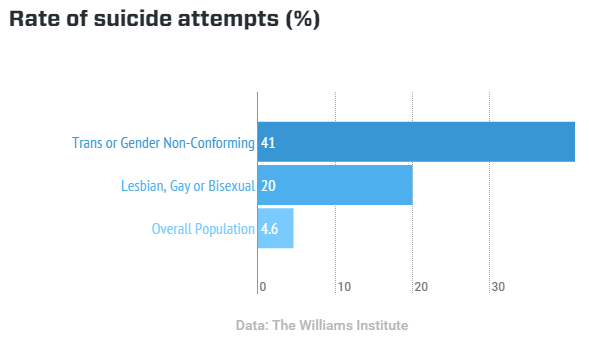How You Can Help Prevent LGBT Suicides
By:
Queer kids are 4 times more likely to attempt suicide than their straight peers; meanwhile, more than half of trans youth will try to end their lives at least once by their 20th birthday. The statistics for the general US population are sobering, too. A 2014 study reports that transgender and gender non-conforming Americans are nine times more likely to attempt suicide than the overall population:

h/t Vocativ
Asher, Zander, Melonie, and Leelah are four of these kids.
2015 started with news that Leelah Alcorn, a trans 17-year-old from Kings Mills, Ohio, had committed suicide on Dec. 28. Memes from her Tumblr suicide note went viral, galvanizing a movement to "fix society" on her behalf and halt such needless deaths in their tracks.
But the suicides have continued. Zander Mahaffey, a transgender teen from Georgia, and Melonie Rose from Maryland, both died by suicide in February. Most recently, 16-year-old Ash Haffner took his life on Feb. 26, stepping into traffic near his home in an act that starkly mirrored Alcorn's death. According to his mother April Quick, Haffner endured years of bullying due to his gender presentation and identity.
Most in the LGBTQ community have lived these numbers.
When I read about Haffner's suicide, it struck home - but I wouldn't know why until I remembered Chris Dow's 2003 suicide. Chris was gay, mostly closeted, and a football player. He was a junior while I was a senior, and we both attended the same high school. We each went through the similar ups-and-downs of LGBTQ teenagers - except I survived and he didn't. I've gone on to be a happy, out, queer transman. Chris never got to be a gay adult.
For me, it got better; for Chris, it didn't.
Bullying and challenges with family acceptance both played a role in Chris' suicide. Anti-gay bullying led to the death of another potential Mira Loma High grad five years later. Based on statistics, he's unlikely to be the last.
But there are practical steps that everyone can take to reduce the risk of LGBTQ youth suicide.
ATTN: asked trans young adults and their allies what one thing they would tell the world about preventing suicide among trans and gender non-conforming youth. These are their powerful responses.
Pat Cordova-Goff | Knowledge:
"Social science classes need to address trans people, with accurate information. Health classes ought to follow suit. Trans youth already feel isolated if they do not have strong supporting trans friends, so the fact that we are almost NEVER taught about our own people is outrageous. [...] The education system has so much potential to prevent the death of students. Youth grow up believing what they are taught, so if they are taught that trans people are valuable and worth life, I know the statistics will fall."
Evan Friedenberg | Resources:
"[A] website that has a bunch of trans resources including the [trans suicide] hotline, places to trade and buy [FTM] binders, trans-friendly health care providers, all should be made available and broadcast at schools. Trainings for teachers every year on providing safe spaces within classrooms and around campus are vital, too, from asking for preferred gender pronouns to having open office hours."
Karen Fenton Hutchison | Safe homes:
"Trust that your child knows who they are and respect that. Let them know that if their identity ever changes it is safe to confide in you again and will not invalidate in your mind who they are now, who they were, or who they are becoming. Make your home the safe place they know they can return to, no matter what they encounter in the world."
Jen Marony | Words matter:
"A change in the dichotomous language of 'boys and girls,' and 'men and women,' as if those are exhaustive categories. Everyday I hear this, and every time I am invisible. Just some sort of recognition that that is not inclusive enough."
Overwhelmingly, the message is that you have the right to be yourself at school and at home.
Trans kids need support. And you have the ability to support them through your actions and your vote for politicians that make trans students a priority.
They're counting on you.
